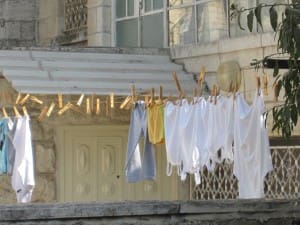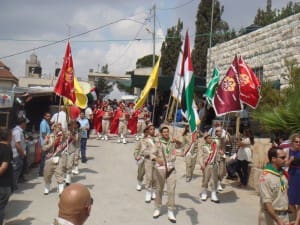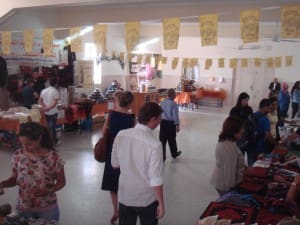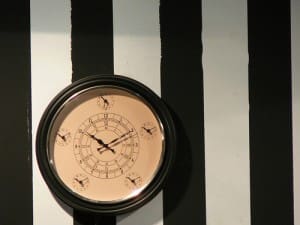“I hope someone kills me before I do another festival ever again. I am at this point hoping and praying to survive….”
This came in an email from a friend who is planning a Palestinian village cultural festival. She’s suffering not just from the amount of work it requires—organizing space, booking cultural performers, recruiting community participation, raising money for it all, publicizing it—but also from the pressure.
On one hand, there is enormous pressure to succeed. A well-implemented cultural festival can bring international and local attention to far-flung villages. It can attract visitors who spend money on local products. It can offer local and international cultural enrichment (singers, dancers, poets). It can draw donors, sponsorships and other kinds of tangible support.
So when volunteers from the community take initiative to put on a cultural festival, it’s a gift of energy and enthusiasm and lots of hard work. It’s a gift to the villagers who experience the direct consequences of occupation (having land and natural resources confiscated by Israel; attacks by army and settlers), and who suffer from high unemployment, infrastructural deficits (water, sewer and electricity), closed markets, isolation, and the range of social and emotional problems that go along with having no hope and feeling like everyone has forgotten you to rot. (No I’m not exaggerating.) It’s a gift to the rest of us who get to visit places we might never have heard of, taste their maftool, stock up on their homemade soap.
 So why, in addition to the pressure to succeed, is there also so much pressure from the community to fail?
So why, in addition to the pressure to succeed, is there also so much pressure from the community to fail?
I’ve heard about situations where the villagers themselves try to sabotage the cultural festival: They take on tasks and don’t do them. They criticize every decision, even if it was made collectively. They try to slander the leaders of the event. They even come to the event and make a mess and refuse to help clean up. Why??
I’ve had the same experience myself in some Palestinian community projects. In one situation, people working on the project began to fight among themselves. They brought others on to their side against the project. They badmouthed the project and sometimes lied – even while they were still active beneficiaries. They ultimately managed to close the project so no one could benefit.
Why??? It isn’t logical! (I know this isn’t pleasant, but we have to talk about our problems in order to solve them.)
Some people say it’s internalized oppression, depression, greed, jealousy, competition, poor breeding. I really don’t know.
I do know that we have a lot of excellent, hardworking community-minded volunteers and we should be supporting them and affirming them, not wearing them down and burning them out.
That’s what I intend to do – get more involved in local events, help spread the word, help them realize their potential for success. To start with, I will be at the Taybeh Oktoberfest this October 6 and 7 from 11 am to 10 pm (directions on taybehbeer.com and taybehmunicipality.org). You don’t need to drink beer if you don’t want to. Just come and enjoy the cultural presentations, buy the local products, and enjoy the historic village.
Also, there is a list of annual cultural festivals and other events of interest at http://visitpalestine.ps/en/discover-palestine/festivals-and-cultural-events. There are monthly updates about local events at www.ThisWeekInPalestine.com. And, there are visits to farms and community gardens organized by Sharaka – Community Supported Agriculture and others. There is so much that is good going on!
Will you help support Palestinian cultural festivals by attending? Will you join your voice with mine to thank and recognize Palestinian volunteers who give of their time and effort to bring joy and benefit to villages despite very difficult circumstances? Will you help counter the tendency towards negativity by working constructively to make things better in Palestine?
To whet your appetite, here’s a draft schedule of events:
Saturday October 6th
11:00 am – Opening Celebration with ecumenical prayer and national anthem; welcome by Honorable David C. Khoury, Mayor of Taybeh; Musikkapelle Leobendorf (band from Bavaria); Greek Orthodox School Folklore Show; The SUN (band from Italy); Taybeh Folklore Dance Group; Trio Dona Zefa (band from Brazil)
1:15 pm – Musikkapelle Leobendorf (band from Bavaria)
2:00 pm – Taybeh Walk (starts at Taybeh Brewery)
2:15 pm – Sri Lanka Traditional Dance and Classical Drums
2:15 The French-German mobile library for children together with Tamer-Institute present story telling (30 min) with Salwa, face painting and other activities for children at the Mobile Library in the bus (open until 5 pm)
2:30 pm – Trio Dona Zefa (band from Brazil)
2:30 pm – Visit the Nasr Priestly Home founded in 1568 built on caves and cisterns (open until 6 pm)
3:00 pm – Yalla Yalla Parade in front of municipality road
3 pm – Have fun watching Ramallah Street Hockey in the Latin School Yard (until 7 pm)
3pm – Experience German in 20 minutes or less! Fun taster lessons in German with Anja! At entrance to Municipality Grounds, preschool building left side (also at 4pm and 5pm)
3:30 pm – “Yalla Farah” Al Harah Theater (Beit Jala)
4pm – “From West to East: A Taybeh Art Exhibition” View works of two diverse and distinct artists sharing the same common thread of being Palestinian. At: Greek Catholic Church Hall (to 8 pm)
4:30 pm – Taybeh Beer Competition with Madees Khoury, Palestinian female brewer
5:00 pm – The SUN (band from Italy)
6:00 pm – DAM – Palestinian Hip Hop
7:00 pm – Al Raseef (Ramallah)
8:00 pm – Taybeh Folklore Dance Group
8:30 pm – Ramallah Orthodox Club
Ongoing – Take a nice walk in the old city to enjoy the amazing Palestinian architecture preserved by RIWAQ and stop by Peter’s Place, home of Holylanders Society for the Preservation of Christian Heritage; View the Taybeh Heritage Exhibition and other hand crafted design jewelry.


Sunday October 7th
11 am – Meet the artists Nabeel Hanna Muaddi and Issa Zawahreh “From West to East: A Taybeh Art Exhibition” View works of two diverse and distinct artists sharing the same common thread of being Palestinian. At: Greek Catholic Church Hall (to 8 pm)
11:30 am – Palestinian Circus School
12:15 pm – Hakaya Children’s Program with Fidaa Ataya
1:00 pm – Musikkapelle Leobendorf (band from Bavaria)
2:15 The French-German mobile library for children together with Tamer-Institute present story telling (30 min) with Salwa, face painting and other activities for children at the Mobile Library in the bus (open until 5 pm)
3:00 pm – German fun taster lessons (until 5 pm)
2:00 pm – Taybeh Walk (starts at Taybeh Brewery)
2:00 pm – Taybeh Beer Competition with Madees Khoury, Palestinian female brewer
2:30 pm – Visit the Nasr Priestly Home founded in 1568 built on caves and cisterns (open until 6 pm)
3:00 pm – Yallah Yallah Parade in front of municipality road
3:00 pm – The SUN (band from Italy)
3pm – Experience German in 20 minutes or less! Fun taster lessons in German with Anja! At entrance to Municipality Grounds, preschool building left side (also at 4pm and 5pm)
4:00 pm – Palestinian Circus School
4:30 pm – X Games (Qalqilia)
5:00 pm – Toot Ard (Golan Heights)
6:00 pm – Al-Rowwad Culture and Theater Society
7:00 pm – Qalandia Blues (Jerusalem)
8:00 pm – Taybeh Folklore Dance Group
8:30 pm – Luminaries (USA) and X Games (Qalqilia)
See you there?


 from the Deccan Chronicle
from the Deccan Chronicle from BBC News
from BBC News